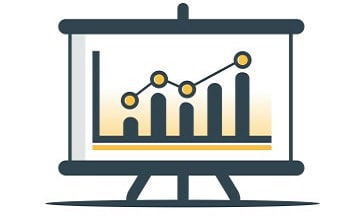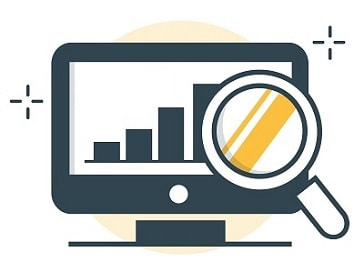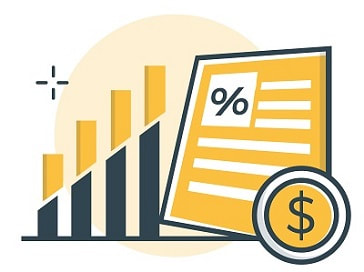Shares vs ETFs - The Definitive Guide
Our guide explains the risks and potential profits from both ETFs and shares, and how they can both fit into your investing strategy.
Updated 7 June 2024
Summary of Shares vs ETFs:
Our guide covers:
Warning: This guide is informational only - MoneyHub does not offer any investment advice, guidance or any opinion on investment options.
- When you buy a share, your investment is a holding in one company. There is no risk diversification – if the company underperforms, your investment will drop in value.
- When you buy an ETF, you’re buying a share that invests in many different companies. An ETF offers risk diversification because if one company underperforms, there are dozens or hundreds of other companies that can counteract the fall in the value of one company.
- Individual shares performance is often talked about, and people get fixated on the share price movements of the likes of big-name companies like Tesla, Facebook and Air New Zealand. However, the reality is ETFs are growing in popularity because they can invest in these high-profile companies while offering far less investor risk.
- Whatever your investing goals, if you’re focused on growth, then shares are the most suitable investment. Owning individual shares is one strategy to achieve this, but ETFs have a lot of benefits and are arguably more attractive to the average investor.
Our guide covers:
- Shares vs ETFs Comparison Table
- Shares - Pros, Cons and the Bottom Line
- ETFs - Pros, Cons and the Bottom Line
- Investing in Shares and ETFs - 5 Must-Know Facts
- Investing in Shares and ETFs with the Right Platform
Warning: This guide is informational only - MoneyHub does not offer any investment advice, guidance or any opinion on investment options.
Shares vs ETFs Comparison Table:
Comparison Facts |
Shares |
ETFs |
What are they? |
A share in a company; each share gives you a right to profits, vote and ownership |
A portfolio of investments. Active ETFs are managed by professional fund managers and aim to beat the market; passive ETFs follow a benchmark |
Who are they best for? |
Anyone who wants to research and pick their own investments, and are comfortable knowing what and why they're buying shares in a particular company. |
Anyone looking for investment diversification to spread the risk. Additionally, anyone unwilling to take the time to research individual companies to invest in. |
What are the fees? |
One-off fees: Brokerage fees and exchange charges when bought or sold. These are charged per share and/or as a percentage of the transaction value |
One-off fees: Same as Shares' fees (as ETFs need to be bought and sold on a sharemarket) Ongoing fees: Annual management fees, known as "expense ratios". It's expressed in a percentage like 0.60% or 1.25% etc. |
How and where can I buy them? |
New Zealand shares: Sharesies ASB Securities Jarden Direct Any Sharebroker US shares: Hatch Stake Sharesies Tiger Brokers (NZ) |
New Zealand ETFs: Sharesies InvestNow Smartshares ASB Securities Jarden Direct Any Sharebroker US ETFs: Hatch Stake Sharesies Tiger Brokers (NZ) |
ETFs Explained in detail:
- An ETF is a type of managed fund which has all the same characteristics (i.e. diversification of investments, lower risk and annual management fee), with one key difference - you can buy and sell ETFs on the sharemarket.
- In New Zealand, the ETFs listed on the NZX are known as Smartshares - and there are a lot of them to choose from. All New Zealand-listed ETFs are passively managed, meaning they follow a particular index or sector.
- In the US, which has the widest selection of ETFs, Hatch and Stake both list hundreds of options which are both actively and passively managed.
- Like index funds, passive ETFs have low management fees.
Why are ETFs so popular?
- ETFs offer all the benefits of managed funds while being as liquid as any traded share. Investors also like the fact you have direct ownership and can buy in and sell ETFs at the desired price (which changes throughout a trading day). This is more transparent than buying and selling funds directly with a fund manager (where you're told what the price is).
- ETFs offer all the benefits of shares - graphs, dividend details and price history, among others. ETFs also compete with each other on fees, so the management fees are kept as low as possible.
- With the benefit of diversified investment risk, ETFs have become increasingly popular in the last five to ten years.
Shares - Pros, Cons and the Bottom Line
Pros:
Cons:
Bottom Line:
- Highly liquid - most shares are actively traded and can be bought or sold in minutes
- No annual or ongoing fees - the only fee you pay is brokerage, which is one-off when you buy and sell
- Full autonomy to invest in what you want to - you can decide what you want to invest in, and buy and sell more as you wish.
- Thousands of options - the NZX and US markets list thousands of companies in hundreds of industries
Cons:
- Not diversified like ETFs - if a share drops in value, your whole investment drops with it. To diversify your investment, you would need to own shares in other companies, which may not be part of your investment strategy.
- Time-consuming to research - making an informed investment decision takes time and a lot of research.
- Exchange fees - whenever you buy or sell a share, you'll most often pay a brokerage fee
Bottom Line:
- Buying and selling shares can feel like a zero-sum game if your profits in some companies are outweighed by losses from others. To be an effective share investor you'll need to do your research. You'll also need to take a long-term review unless you're actively trading.
- To do due diligence on potential investments, you'll need to look at its earnings, management, balance sheet and interim reports. For company commentary and analysis, there is no shortage of trading websites to help you research, but it is time-consuming and needs a serious effort.
- Investors enjoy the thrill of watching shares they've purchased increase in value. ETFs won't ride the high of investing in a company like A2 Milk or Xero and see it rise from $1 to $15 or even $70, but realistically Xero-type performances are relatively uncommon.
ETFs - Pros, Cons and the Bottom Line
Pros:
Cons:
Bottom Line:
- Diversification - ETFs invest into dozens or hundreds of individual companies, so the risk is spread
- Targeted options - ETFs, like managed funds, focus on a particular investment type, such as companies in the NZX50 shares, energy sector or banking sector.
- Professional management - ETFs are run by experienced management companies who operate to maximise the return on the investors.
- Low trade costs and ongoing fees - ETFs buy and sell shares at such volumes that there are significant efficiencies. This means whatever costs you incur are much lower than you could arrange independently.
- Convenience - ETFs don't require the investor to do anything, other than buy and sell their holding when they want to take a profit (or crystallise the losses should the ETF under-perform).
- Low minimum investment - ETFs can be purchased using investment platforms like Sharesies, Hatch and Stake for as little as a few dollars.
- New Zealand-listed ETFs are PIEs - If you're buying ETFs in New Zealand assets, all the Smartshares ETFs are PIEs which means the investment returns are taxed at a top rate of 28% which benefits top-rate taxpayers.
Cons:
- Annual expense ratios and trading fees - ETFs charge an annual fee, just as a managed fund or KiwiSaver fund does, and you'll also be charged brokerage when you buy and sell. How much you pay depends on the platform. For example, buying Smartshares is free with InvestNow, but you'll pay a fee if you use Sharesies. ETFs listed on US markets can be bought using Hatch or Stake.
Bottom Line:
- Generally, as an investment option, we favour products that are committed to low or transparent fees, have proven returns and put you first. ETFs, as a whole, usually deliver on all those things.
- Furthermore, most ETFs are passively managed, meaning they have low fees and maximise your returns as a result. An ETF which follows an index or benchmark offers a diversified investment option that, in the long term, help you reach your investing goals.
- To be a responsible investor, you'll still need to monitor the price of the ETF and make sure you're comfortable with the performance.
Investing in Shares and ETFs - 5 Must-Know Facts
Whether you decide to invest in ETFs, shares or both, there are some smart ways to save money when investing to increase your profits in the short and long-term. We outline the most important facts below.
It's best to compare Sharesies, InvestNow, Hatch, ASB Securities, Stake and Tiger Brokers (NZ) to find the best platform for your needsOur platform comparison guide outlines what each platform offers, the fees (per trade and subscription, if any). If you want to invest in US shares and/or ETFs, both Hatch and Stake compete on price and features. Our dedicated Hatch vs Sharesies vs Stake review details the specifics, as does Sharesies vs Tiger Brokers (NZ). Most of the platforms are free to join and many offer a signup bonus when you register. Only Sharesies has ongoing monthly membership fees (which can eat into profits).
|
Some US-listed ETFs are actively managed, and you can buy them using Hatch and StakeWhile most ETFs are low-fee, index-tracking passive investment options, a handful of ETFs are actively managed. This means they operate with a portfolio manager in the same way a managed fund does. The most popular active ETFs are listed in this guide from investing authority The Balance.
|
NZX-listed ETFs are limited - 99% of the investment opportunities are on the US markets, and they (usually) have significantly lower fees by comparisonNZX-listed ETFs are limited to around twenty Smartshares, which are categorised under names like "SmartLarge", "SmartDividend" and "SmartSector", among others. The fees range between around 0.30% p.a. and 0.70% p.a. and investors can get local and international exposure.
Beyond the NZX-listed ETFs, the US markets are where hundreds of ETFs trade daily. The best way to know what's available is to join a free US trading platform like Hatch or Stake, and filter by ETFs. Know this: US-listed ETFs continue to outperform NZX-listed ETFs on fees. A research report by GoodReturns.co.nz stated that some (but far from all) US equity ETFs are very cheap and in some cases offer an expense ratio less than 0.10% - but not always. Before making any decision, compare the fees of the ETF you're looking at with the NZX Smartshares equivalent (if there is one). Where can I find information about US-listed ETFs? Websites like The Balance publish independent insights into ETFs which can help your investment decision-making process. |
ETFs won't offer the upside or excitement of picking an undervalued shareETFs, unlike (rare) top-performing shares, don't tend to increase in value like shares do. For example, it's highly unlikely an ETF will increase in value from $1 to $70 (as Xero accomplished), or jump 10% a day like high-performing shares can when positive earnings news is announced. Instead, ETFs are considered to be 'quiet achievers' that follow the movements of a specific market or sector, mirroring its performance.
What this means is that investing in ETFs requires little ongoing research; most investors keep an eye on the price every few weeks. Conversely, investors who have taken the time to pick their share portfolios more often than not check share prices daily to monitor the profitability of their investments. |
ETFs don't just invest in shares - they offer exposure to many different asset typesWhile many ETFs invest in shares, many US-listed ETFs invest in bonds, a mix of shares and bonds, currencies, commodities, and more. This offers investors further diversification given that the ETF's performance isn't tied to movements in the sharemarket.
|
Investing in Shares and ETFs with the Right Platform
To be able to invest in shares and/or ETFs, you'll need to sign up to an appropriate investment platform. The best option is a platform which offers shares and ETFs so you can diversify your investments as much as possible while minimising fees. A platform with low trading fees and a user-friendly interface is preferable. Popular options include:
- Sharesies (offers managed funds, ETFs and individual shares in NZ, Australian and US markets)
- Tiger Brokers (NZ) (offers ETFs and individual shares in US, Australian and selected Asian markets)
- Smartshares (offers ETFs which invest in New Zealand and overseas markets)
- InvestNow (offers New Zealand ETFs)
- ASB Securities (offers ETFs and individual shares in New Zealand markets)
- Jarden Direct (offers ETFs and individual shares in New Zealand markets)
- Hatch Invest (offers US-listed shares at ETFs)
- Stake (offers US-listed shares at ETFs)
- Want to compare Sharesies with Hatch and Stake for US Shares? Visit our Sharesies vs Hatch vs Stake Guide










